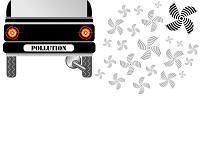The quality of your indoor air is important for your health and safety. Many of the products inside our homes lower the quality of the air, such as certain appliances and their byproducts. Your attached garage can also lower the air quality of your Massachusetts home by sending harmful garage emissions into your house, such as carbon monoxide, dangerous chemicals, emissions from gas-powered appliances and even mildew and mold spores.

Although garage emissions can be dangerous, there is no need to worry. You can make several small changes to your garage that will help keep harmful pollutants out of your central air system:
- Seal any leaks between the house and garage with caulk, spray foam insulation or any other airtight sealant. Pay special attention to cracks in the walls or ceiling and the door itself.
- Install an exhaust fan to pull contaminated air out of the garage. Run the exhaust fan for several minutes a day to keep the air clean and the pressure inside the garage low. The lower the air pressure inside the garage, the less likely air is to seep into the house.
- Remove as many pollutants from the garage as possible, such as lawn products, paint, cleaning supplies and other chemicals. These products can pollute the air. Move these items to an external storage unit.
- Keep the garage door open when the car is running. This will prevent the buildup of carbon monoxide inside the garage. Consider adding a carbon monoxide detector near the garage to prevent carbon monoxide poisoning.
For more information on other ways to improve the air quality of your Massachusetts home, contact us at Rodenhiser Pluming, Heating & Air Conditioning. We offer several air cleaning methods and are happy to help you find the best fit for your home, needs and lifestyle.
Our goal is to help educate our customers about energy and home comfort issues (specific to HVAC systems). For more information about other HVAC topics, download our free Home Comfort Solutions Guide.
Car exhaust image via Shutterstock